Keep up with Ten
All the latest from In10macy and more
All the latest from In10macy and more


The
PHILOSOPHY of In10macy




IN10MACY IS A LUXURY STORYTELLING PLATFORM.
BUILT FOR MEN WHO THINK DEEPLY — AND WOMEN WHO NEVER SHRINK.
We craft stories that feel like truth,
read like cinema,
and stay with you like memory.
This is where elegance meets edge.
Where modern masculinity meets soul.
Where women expand, not shrink.
Where healing and high standards walk hand in hand.
WHO IT’S FOR:
The emotionally intelligent.
The spiritually rich.
The ones who crave beauty with depth —
and words that mean something.
"SOME STORIES DON’T ASK FOR SPACE —THEY TAKE IT."
This is your Hood Author, Mr.10


A soundtrack for love that feels like legacy. Slow burns, soul notes, and late-night rhythms curated to match Malik & Amara’s journey. Music for the ones who see love as partnership, not performance.
Enjoy the vibe? Follow IN10MACY on Spotify and never miss the soundtracks to our stories. Weekly gems, luxuriously intimate.
They call her ambitious.
I call her unstoppable.
Every morning she’s out the door before sunrise, heels clicking against concrete like a metronome to her hustle.
Laptop in one hand, coffee in the other, mind already two steps ahead of the day.
And me? I’m posted up on the corner, pretending not to notice.
But truth is
I can’t take my eyes off her.
Because here’s the paradox:
I hate to see her go. But I love to watch her leave.
Not just because her walk could make silence stutter
— but because that walk means something.
It carries every late night she stayed grinding, every “no” she turned into “watch me,” every barrier she broke without asking permission.
See, a 10/10 isn’t just curves and confidence.
It’s discipline. It’s sacrifice.
It’s the way she makes success look soft when you know it cost her sleep, peace, and sometimes even love.
And that’s what men don’t always admit — we don’t just desire women like her, we admire them. They remind us of who we we are.
She’s the type you pray to keep but clap for even if she leaves.
Because when you meet a woman like that?
You don’t cage her.
You honor her.
Hate to see her go.
But love to watch her leave.
Not because of what she looks like walking away.
But because of everything she’s walking toward.
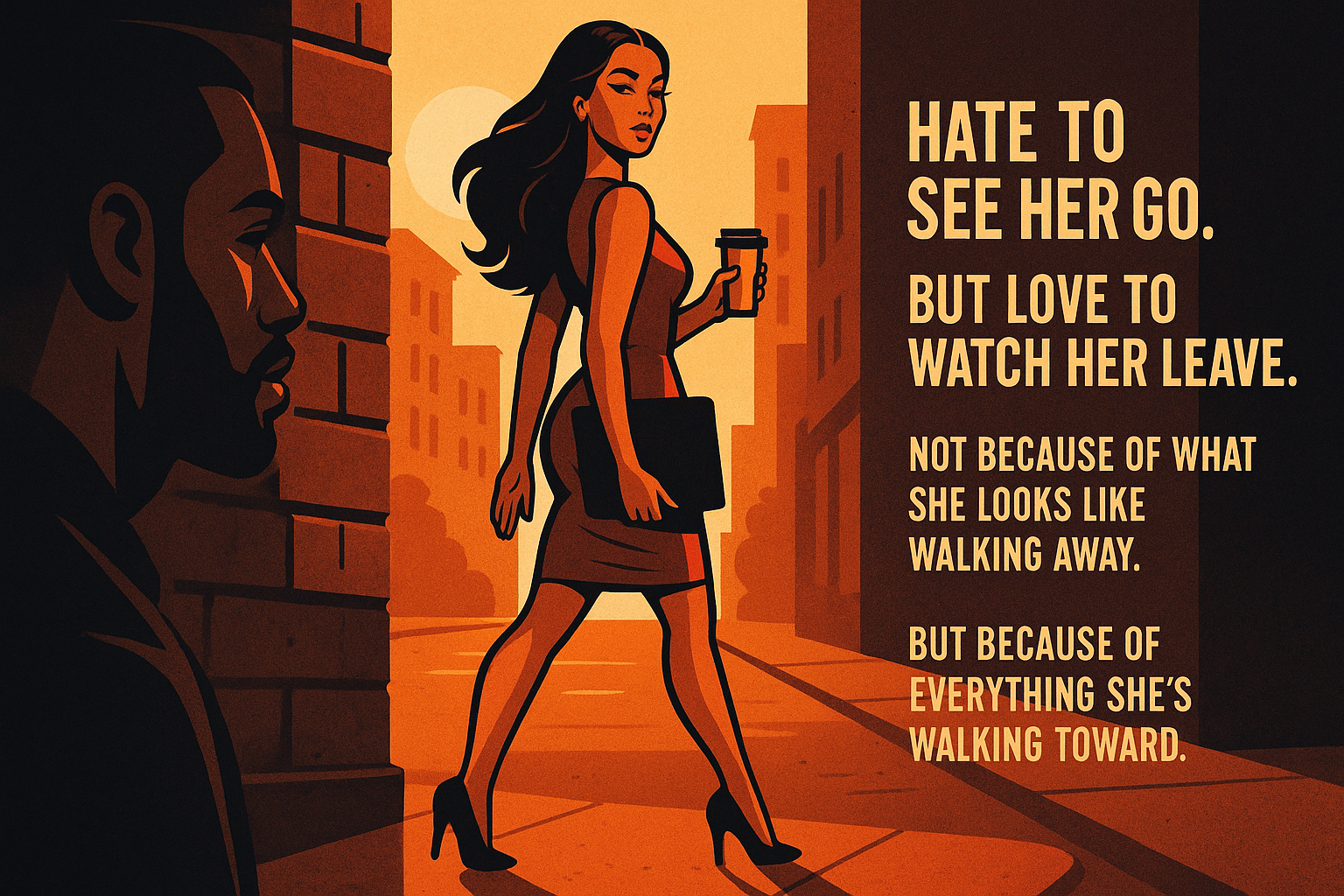
Malik sits at the kitchen table, coffee cooling faster than he can drink it.
The clock ticks — sharp, impatient. 🕰
And there she is.
Amara.
Hair tied back,
work bag over her shoulder,
ALVARÓ heels in one hand because the pavement outside will eat them alive.
She moves like time don’t scare her, but deadlines do.
Moves like love is second nature, but ambition is oxygen.
Malik watches her.
Not just because she’s his wife.
Not just because the light from the window crowns her like something holy.
But because she has that thing.
That 10 out of 10 thing.
The kind of presence you can’t control.
The kind of presence you only witness.
“Hate to see her go,” he mutters under his breath, a half-smile tugging at his face.
“But God knows… I love to watch her leave.”
It ain’t about lust.
It’s about legacy.
Because every step Amara takes out that door, she’s walking for more than herself.
She’s walking for the women before her who never got to walk this freely.
She’s walking for the man who still don’t know how to catch up.
Malik knows it.
He feels it in the pit of his chest.
And deep down, he wonders:
What does it take to love a woman built like that — not with possession, but with protection?
Not with fear, but with faith?
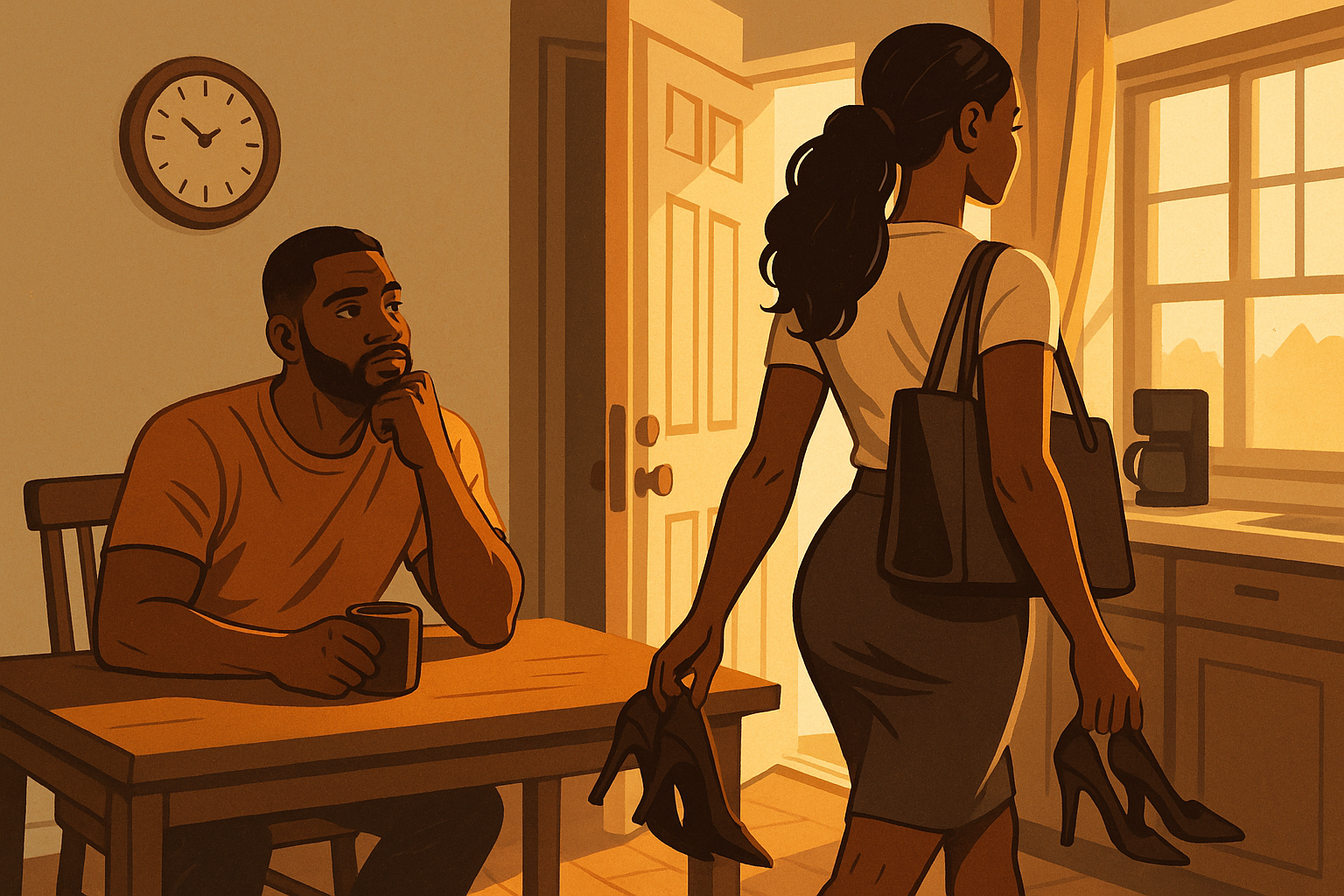
Later that week, the house don’t sound like love.
Plates clink harder than they should.
The silence stretches longer than the distance between them on the couch.
Malik scrolls his phone like it owes him comfort.
Amara stares at her laptop like the world depends on another email sent before midnight.
Then it slips.
Malik says it low, but heavy enough to split the air:
“You always leaving. Even when you’re here.”
Amara doesn’t flinch. Doesn’t raise her voice. That ain’t her style.
She just looks at him — like the mirror you avoid in the morning because you already know what it’ll show you.
“Maybe,” she says softly, “you just don’t know how to stay.”
The words land.
Harder than any shout.
Because truth rarely screams — it just sits in the room until you can’t breathe around it.
Malik don’t reply. He don’t know how.
And that’s when it hits him:
Admiring a 10/10 woman is easy.
But loving her? That requires him to be a 10, too.
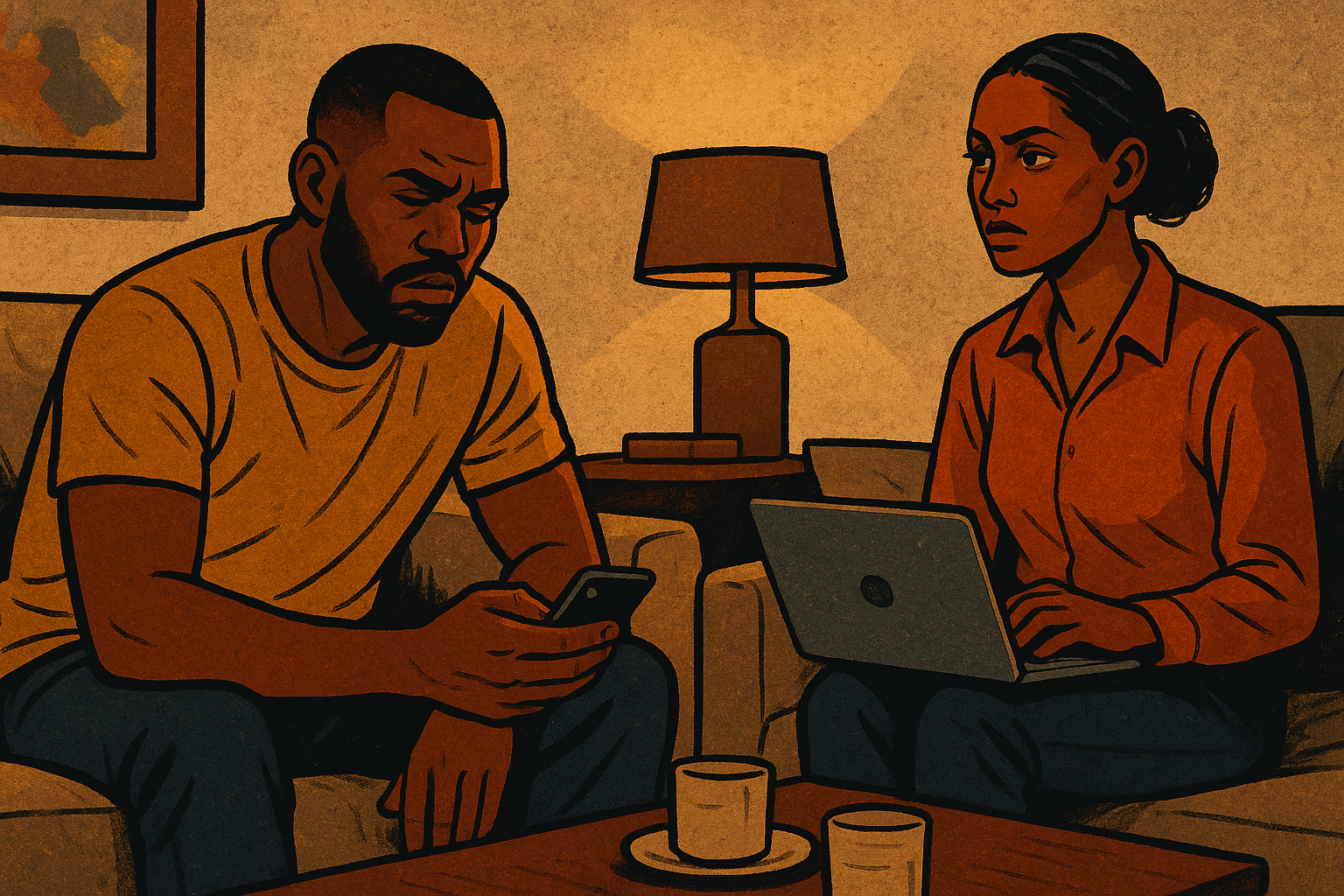
That night, Malik lays on the bed, staring at the ceiling like it might answer for him.
Amara’s side of the bed still warm, her perfume still floating in the air — but she’s at her desk in the next room, chasing deadlines he never bothered to ask about.
His phone buzzes.
Group chat banter.
The lads talking nonsense about ball and betting slips.
He laughs at first — but the laugh dies quick.
Because the truth?
None of them would know what it’s like to come home to a queen and still feel like a jester.
He remembers the way Amara looked at him earlier.
Not angry.
Not even disappointed.
Just… done with waiting for him to show up.
And it stings.
He used to watch women leave.
But with Amara, he finally saw where he was meant to go.
He rolls over, catching his reflection in the darkened TV screen.
Eyes tired. Spirit heavier than his body.
And it hits him — she wasn’t accusing him of absence.
She was begging him for presence.
For once, Malik don’t rehearse the comeback.
He don’t scheme the excuse.
He just whispers into the silence, half to himself, half to God:
“Teach me how to stay.”

Amara sits at the desk, lamp light catching the curve of her cheek.
Laptop open. Deadlines stacked. Coffee cold.
But that’s not the real weight.
The real weight is carrying a home on her back while being invisible in it.
She hears Malik shift in the bedroom, phone buzzing again with group chat noise.
She exhales.
Not in anger, but in exhaustion.
This is what people don’t tell you about strong women:
Strength ain’t a gift. It’s a burden.
She remembers their vows — the promise of partnership, of building together.
Yet most nights feel like a solo shift, clocking in as wife, worker, healer, and ghost.
She could leave.
She knows her worth would carry her somewhere else.
But she doesn’t want “somewhere else.”
She wants him.
The man she believed in when nobody else saw potential.
Her silence tonight isn’t punishment.
It’s prayer.
A quiet plea that Malik will stop chasing echoes and start becoming the voice he was meant to be.
She closes the laptop, folds her hands, and whispers under her breath:
“Lord, don’t let me love him more than he learns to love himself.”

The house is silent.
Not the heavy silence of anger, not the sharp silence of distance—
but the kind of silence that feels like both of them are breathing the same air again.
Malik sits at the edge of the bed, tie loosened, eyes lowered.
Amara is by the window, arms folded, looking at a streetlamp that flickers like it’s tired too.
No shouting this time.
No breaking.
Just a pause long enough for truth to walk in unannounced.
Malik clears his throat, words slow, softer than she expected:
“I don’t want to lose you. Not to the world. Not to myself.”
Amara doesn’t move at first.
She’s heard promises before—
the kind that sound good in the moment but fade by morning.
But this time, there’s something different.
No performance. No poetry. Just plain honesty, sitting heavy in the room.
She exhales. Steps closer.
Not forgiveness, not forgetting—just a willingness.
Because sometimes love isn’t loud.
Sometimes it’s the small choice to stay in the room when it would be easier to leave.
And in that fragile quiet,
they don’t solve everything—
but they start something new.
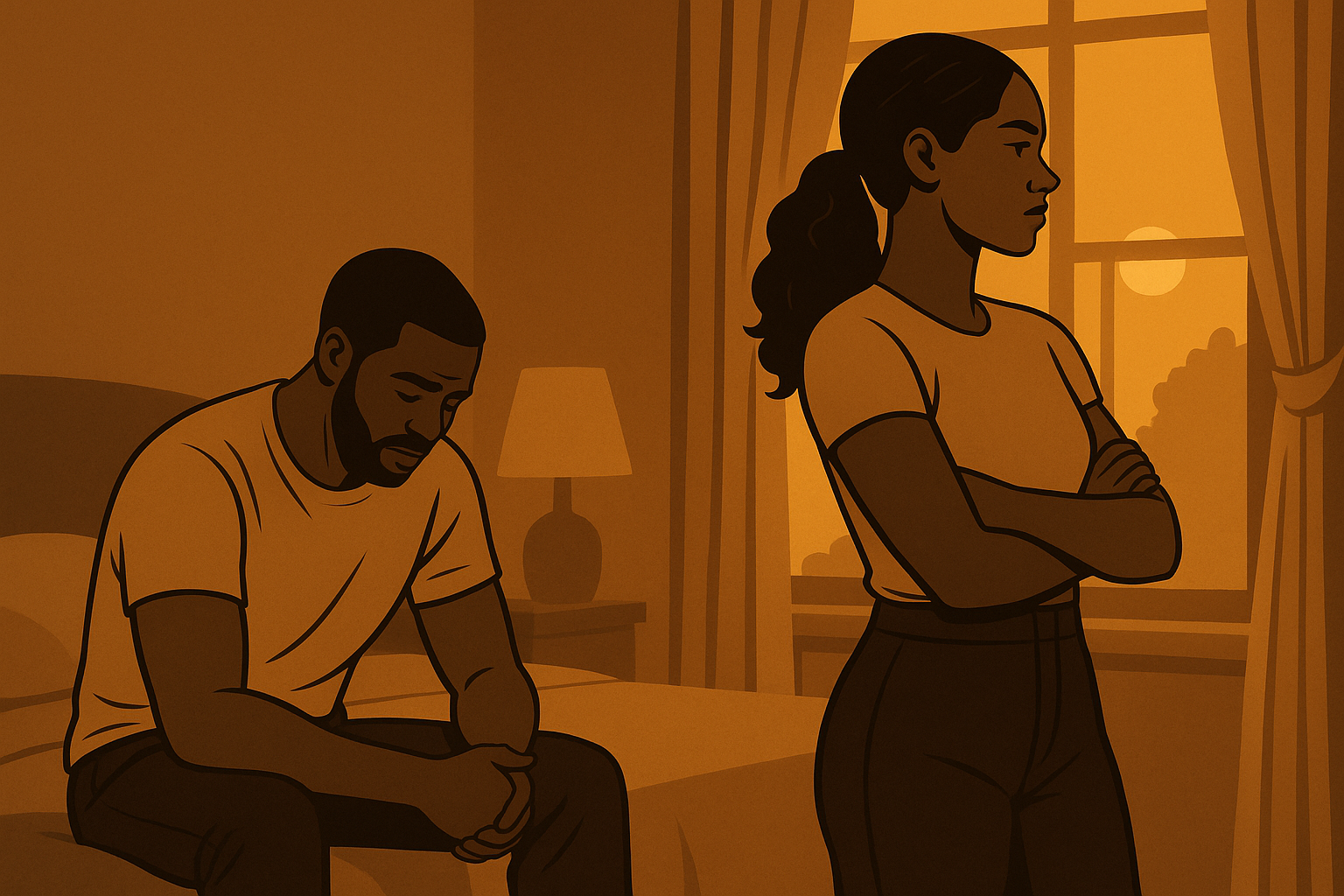
See… when you strip away the noise, the truth is simple:
She ain’t my rival. She’s my rhythm.
Not competition — completion.
The world will try and paint her shine like it dims my own.
But real men know: when she moves, it ain’t a threat, it’s a testimony.A reminder that God didn’t make halves to compete — He made them to connect.
Marriage ain’t about measuring.
It’s about mirroring.
If her strength makes me feel small, that ain’t on her — that’s on me.
Because her grind is supposed to grow me.
Her light is supposed to lift me.
Brothers, hear me: don’t confuse her victory for your loss.
Stand beside her, not behind her.
Clap when she climbs, learn when she leads, love when she leaves the house shining.
Because the biggest blessing you’ll ever hold?
Isn’t proving you’re the man.
It’s realizing you married your other half.
#IN10MACY
#10Out
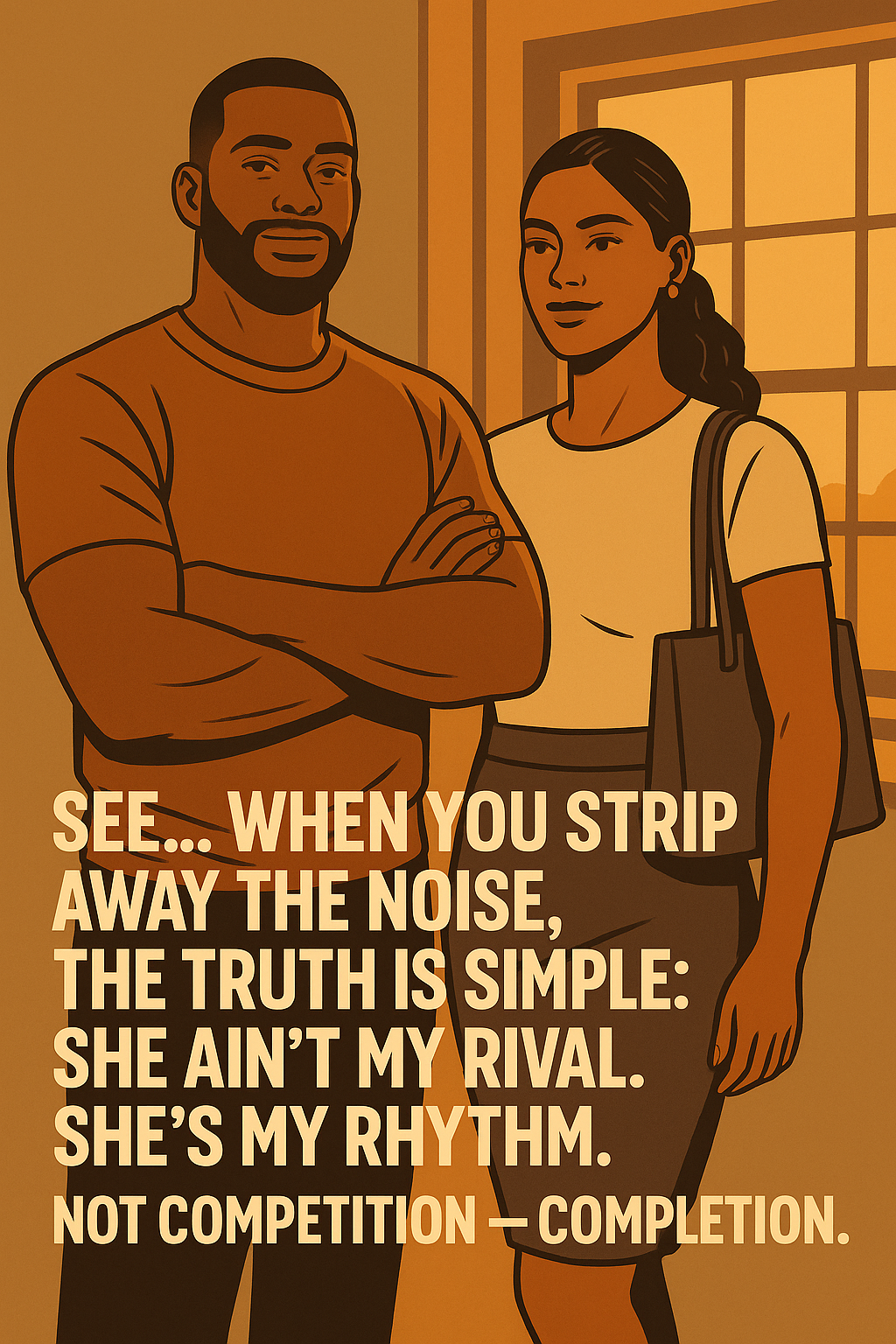
Greatness in love ain’t about proving who’s stronger.
It’s about recognizing that when she wins, you both do.
“He used to watch women leave. But with Amara, he finally saw where he was meant to go.”
TEN FAMILY — we’re almost at 20 posts.
And when we hit it?
The full stories move exclusively to Substack.
No algorithm.
No noise.
Just unfiltered IN10MACY in your inbox — where it belongs.
If you’ve been reading, feeling, learning?
This is your sign to lock in.
💌 Subscribe to IN10MACY on Substack
Because the next chapter won’t live on the feed.

Born on the first year of the greatest century to ever exist, its only makes sense that a name like mine was a part of the equation. But even a ni**a like me got no blueprint. With mortals like 2Pac, Hugh Hef’, and the Great Gatsby breathing, the youth in me figured out the game. After all, real recognizes real. But what did ‘real’ mean to a ten-year-old me?